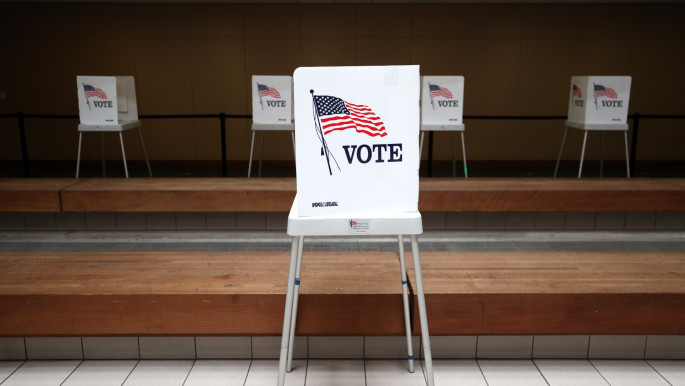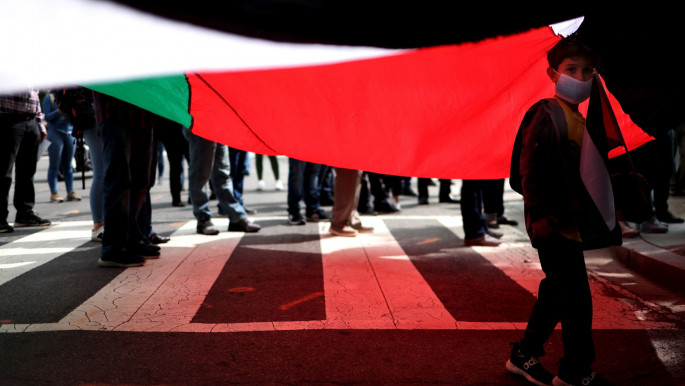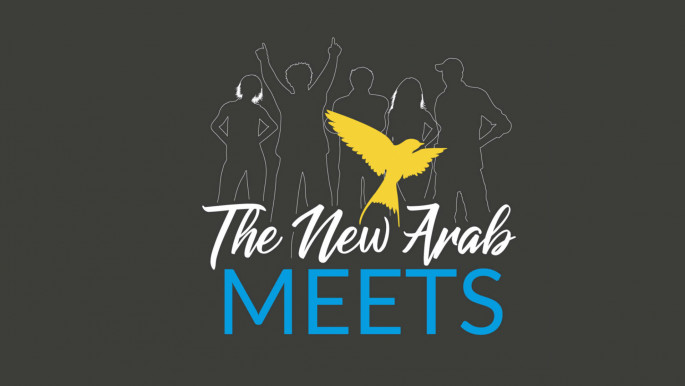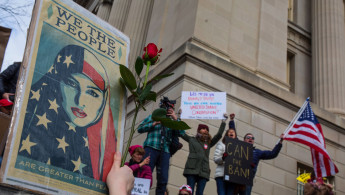For Muslim Americans, Trump has added fuel to the fire of Islamophobia
For Nihad Awad, the Executive Director and co-founder of the Council on American-Islamic Relations (CAIR), the largest non-profit Muslim civil rights and advocacy organisation in the United States, the last four years have consisted of fighting for justice and defending the civil rights of American Muslims in the face of discriminatory actions from the White House.
Academics, legal rights experts, and advocates have all noted that Islamophobia has gone mainstream under the Trump administration. In a recent interview, Awad told The New Arab, that this has had a "devastating effect on American Muslims, in particular, young Muslim students who have been bullied by their peers and sometimes even their school officials, leading to a sharp rise in the reported cases of bullying" in the country.
In addition to harassment, Muslims across the country witnessed their mosques become targets of vandalism and arson. "All of this because Islamophobia has been normalised and empowered by the most powerful people in the country, such as Trump. Trump has added fuel to the fire of Islamophobia," said Awad.
 |
Islamophobia has been normalised and empowered by the most powerful people in the country, such as Trump |  |
Trump's presidency has also given rise to more people getting involved in politics, advocacy, and community organising. Awad stated that in the past four years, he's seen "tremendous interest in American Muslims not only registering to vote and voting but also running for public office. More than 300 American Muslims ran for office and almost 45%-50% won seats at the federal level, state level, and local level."
This 'blue Muslim wave' as it was called resulted in the election of the first two Muslim congresswomen, Rashida Tlaib and Ilhan Omar.
"American Muslims and other groups in the country are aware of the dangers of nativism and white supremacy on the country, on the fabric of the United States, on the unity, and the integrity of our nation. These have been really strong motivations for American Muslims to become more civically and politically engaged," the director of CAIR noted.
 |
|
| Read more: The Arab and Muslim candidates fighting to transform American politics |
A recent survey by the Institute for Social Policy and Understanding (ISPU) confirmed Awad's observations, finding that American Muslims are more politically engaged in 2020 than ever before: 78 percent of eligible Muslim voters in the United States are registered to vote this year, a sharp increase from just 60 percent in 2016.
From Awad's perspective, countering Islamophobia is a key driver "mobilising the community." This has involved lobbying Congress and pushing forth bills such as the No Ban Act. Other issues of concern for American Muslims include surveillance, which Awad said is a policy that's "been applied to American Muslims throughout different administrations and continues to be used and employed as measures to surveil American Muslims' protected activities nationwide."
It's an issue that CAIR is "very concerned about," and has been fighting in both the courts and in the "court of public opinion." In addition to police reform, addressing anti-Black racism, and opening America's doors to immigrants, American Muslims are also concerned about the usual issues of healthcare, education, and rebuilding the infrastructure.
The Covid-19 pandemic has had a devastating effect in the country as over 200,000 Americans have died. Awad states that while he's personally "not very excited about Biden's candidacy," he hopes that if Biden wins, it would at least mean that "science is leading our policies" when it comes to fighting the novel coronavirus, and that hopefully "health precautions will be taken seriously to save the lives of Americans."
 |
We cannot predict the future but we have tightened our seatbelt for a long ride |  |
The United States is currently seeing a massive surge in infections, as it recently broke the daily record for cases topping 80,000. In light of these numbers, the CAIR director said, "anybody but Trump would do a little bit better job, I hope, and that they will fight the virus instead of fighting the doctors and healthcare advisors that are trying to protect us."
Biden has promised that he would repeal the Muslim Ban on day one of his administration and he has also pledged to appoint American Muslims at every level of his administration. The former Vice President has however supported harmful policies in the past, such as Countering Violent Extremism programs, which had a detrimental impact on American Muslims communities.
 |
|
| Read more: Yousef Munayyer: 'Palestine activism will continue to grow in the US' |
Noting this, Awad pointed out that he thinks the majority of American Muslims this election cycle are more so "voting against somebody, against something than for something. They just want to end some of the suffering."
When asked about what a possible four more years of Trump could look like for American Muslims, Awad stated that organisations like his and others "will continue to do our work by defending the civil rights of American Muslims, organise our communities to stand up for justice, and build coalitions with other marginalised minorities."
The anxiety and worries are present for a community that has long been on the receiving end of Trump's xenophobic and racist rhetoric, but Awad states that "we cannot predict the future but we have tightened our seatbelt for a long ride. We hope that this era will come to an end, but if it doesn't, we're here".
"We're not going anywhere, and we'll pushback and use all the tools at our hands in terms of politically organising and the courts, to defend the values of this country and defend the constitutional rights of all Americans."
Mobashra Tazamal is a researcher on Islamophobia at The Bridge Initiative at Georgetown University. Her work has appeared in Al Jazeera, The Independent, Middle East Eye, and AltMuslimah.
Follow her on Twitter:@mobbiemobes
Read more from The New Arab Meets special section below:
 |
|



